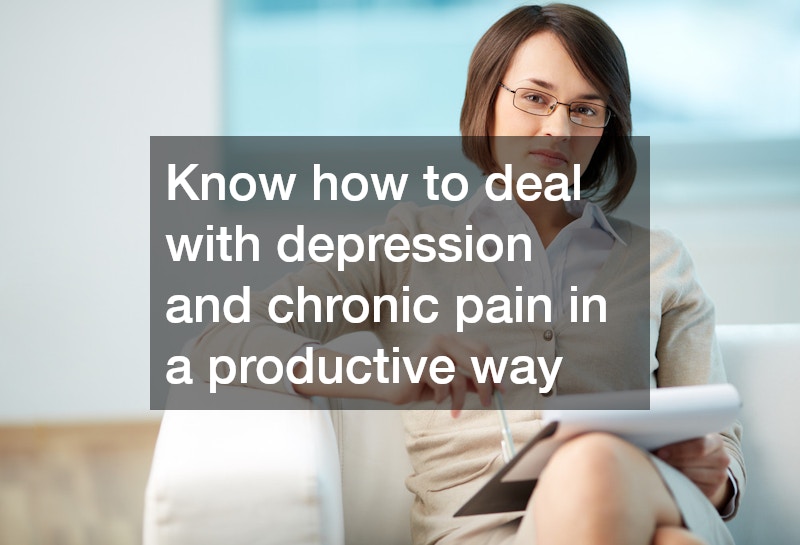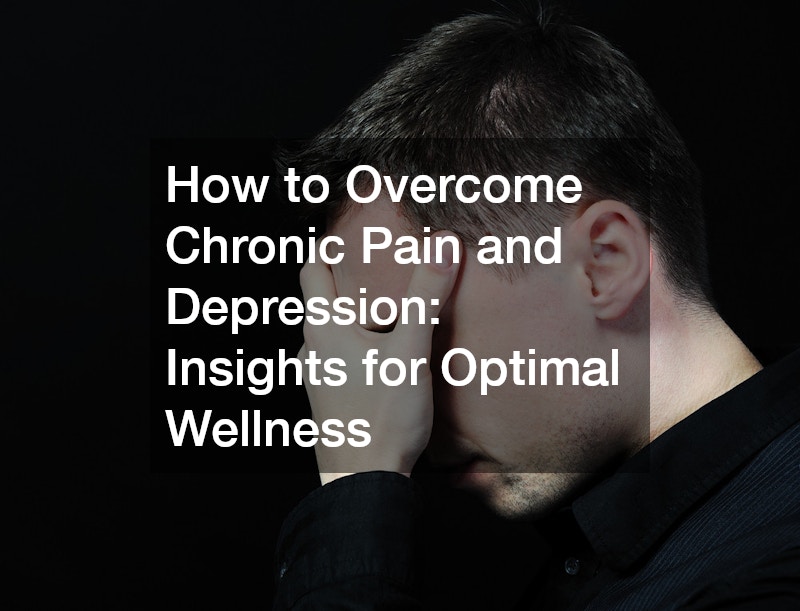The two most difficult problems to overcome are physical pain and mental depressive disorders. Both can demotivate and complicate your life. Here are some tips on how to live well and navigate through life despite pain and condition. You will be able to survive chronic pain and depression if you read these tips.
Explore Holistic Healing Options
You can benefit greatly from a pain management doctor. However, you don’t need to go with a traditional doctor. You can choose to work with a holistic physician instead. A holistic doctor will help you create recovery strategies that do not involve medication. He or she might help you develop a muscle-stretching plan that can make you stronger as long you follow it.
The professional may also suggest dietary changes that you can make in order to reduce inflammation. The provider may also be able to tell you more about herbs or natural elements that can help you cope with chronic pain.
You can choose a holistic physician to guide you through your recovery journey for many reasons. Most people choose holistic doctors because they offer a more intimate relationship with their patients than in most other doctor-patient relationships. Holistic doctors encourage patients to be involved in their recovery plans.
You will then feel that your doctor is a partner in your health, not a robot. Holistic care also reduces, and in many cases eliminates, the likelihood of an adverse reaction. You can also get a third good reason for hiring a holistic provider. This type of provider will give you a better chance to see a long-term improvement than anyone else.
Consider a Medication Management Plan

If you are not sure how to deal with depression and chronic pain, medication management is an option. Medication management involves using medicinal aids to relieve chronic pain. If you wish, you can also use medication to treat your depression. You can choose from a variety of options to treat your physical pain.
Anti-Inflammatory Medications:
Anti-inflammatory drugs are the least addictive drugs for chronic pain. You may want to start with them before trying something stronger. These drugs work by lowering the body’s prostaglandin production. Inflammation is caused by prostaglandins.
If you suddenly stop producing these substances, your body’s inflammation will go down. Ibuprofen, which is not addictive, is one of the more popular drugs of this type. It can cause stomach problems if you take it in excess.
Narcotic Medications:
Some doctors prescribe narcotic medication for chronic pain. These drugs work by binding with your opioid receptors, causing an effect similar to a morphine-like high. You will not feel any pain because your body will release dopamine.
While the effects of the pill are evident, you may also not feel any emotional pain. Narcotics are dangerous because they can mask pain. Although they are effective in reducing pain, they can cause addiction due to how well they mask the sensation. If you receive a prescription, it is important to be careful.
Muscle Relaxers:
Muscle relaxers, a type of medicine, are not as addictive as narcotics. These drugs are used to treat illnesses such as cerebral palsy and multiple sclerosis. In rare cases, doctors also use these drugs to treat anxiety disorders.
If you choose to seek help for chronic pain or depression, you will have these options and more.
Seek Parenting Support
When you are in pain, it can be difficult to take care of your children. You know that they are counting on you, and you cannot quit. You can still do your best to be the best parent you can be and give everything you have to your child. Here are a few tips:
You will need your partner even more during this period. You should ask your partner to take on a greater role in the life of your child while you are recovering from your illness or injury.
You can ask a friend or family member to help you if the parenting support does not work. You can ask them to take care of your kid for a night or even a few short hours. This will allow you to take a little time for yourself.
Communicating with Your Child:
You should take time to tell your child that you love them. You can try to explain the pain you are in physically and your depression so your child understands that it is not their fault.
You can stop your child from blaming themselves for their parent’s problems. You might become closer by having a heart to heart with your child.
Utilizing Childcare Services:
You can also get help managing chronic pain or depression by using childcare services. You may also want to enroll your child in a facility which offers social and exciting events for children. You can take time to heal by sending your child to a place where they can grow and interact with other children.
Chiropractic and Physical Therapy Options
A chiropractor can teach you how to cope with chronic pain or depression. He or she may be able to relieve you of a lot of your pain. Back and neck pain can be caused by the spinal cord not being aligned.
Chiropractors are able to realign the spines of their patients through a series of appointments. You could benefit greatly from scheduling an initial appointment. You will know within a few days if an adjustment is able to help with your pain.
Seeking Help from a Physical Therapist:
You can also get physical therapy if you want to learn how to deal with chronic pain or depression. Physical therapists work with patients to develop strategic movement plans that will help them reach their maximum potential over time. If you suffer from a sports injury, this is the provider to see.
Applying for Disability Benefits:
If you are suffering from chronic pain or depression, consider applying for disability benefits. If you are unable to work due to a severe injury or illness, you can apply for Social Security Disability benefits.
To find out if the benefit is available to you, you will need to contact an attorney and submit an application to the SSA. If you are unable to work and have difficulty performing everyday tasks due to your injury, you will have a good chance of being approved.
Visit an attorney to learn how to deal with chronic pain or depression. You will receive a check each month that can help improve your quality of life.
Legal Assistance for Compensation
If you believe that your doctor has misdiagnosed or failed to diagnose you in a way that meets medical standards, you may be entitled to compensation. You can use the money you receive from a medical malpractice lawsuit to help support your family during your recovery while you are unable to work. You’ll learn how to cope with chronic pain, depression, and other symptoms.
If someone was negligent, you may be entitled to compensation. In cases such as slip-and-fall accidents or car crashes, negligence is common. You can speak to an attorney to determine if your case is eligible for compensation. Then, you can receive the money you need to pay your bills, medical expenses, and treatment. If you get a good settlement for your injuries, you’ll know how to deal with chronic pain and depression.
Home Delivery of Medications
If you don’t need to, there’s no point in talking about the long trip to the store or pharmacy. A pharmaceutical service can deliver your medication directly to you. You can order online after signing up. Your meds may be available in 90-day increments. One way to learn how to manage chronic pain and depression is to drive as little as you can.
Address Mental Health Challenges

Depression and anxiety can be crippling illnesses. To improve your quality of life, you will need to first take action to address them. You’ll then know how to deal with depression and chronic pain in a productive way. You can use these options to help you recover from depression and chronic pain.
Counseling or Therapy:
Your belief system will determine how you handle anxiety and depression. If you think their services can help, you could see a therapist, psychologist, or counselor.
It could be a childhood memory or an event that was traumatic. The providers mentioned above can help you on a discovery journey to discover the root of the problem.
Life Coaching:
You might find it easier to talk with a life coach than other providers. They don’t usually claim to be psychiatrists or psychologists. They may have special certifications and degrees, or they may not.
They are often everyday people with a good ability to communicate and a desire to help others find their path. They are from all walks and backgrounds, and their pricing and expertise vary. You might have to wait a little while before you find the right one.
Self-Help Methods:
Self-help is also a good option for those who want to learn how to cope with chronic pain or depression. Reading books, watching educational videos, being around positive people and friends, and pampering yourself are all common self-help methods.
You have to love yourself, and appreciate all that you can offer the world. Self-help is preferred by some people so no one can interfere with their progress. You have the right to select this method.
Faith-Based Solutions:
Faith-based healing is another alternative way to heal anxiety and depression. If you have a higher power, this is a good time to connect with it. Meditation is an excellent way to begin.
You can meditate in two different ways if you want to learn how to deal with chronic pain or depression. You can use spiritual texts or Scriptures to meditate or find a happy spot and focus on it.
Find a place to relax, either inside or outside. You can ‘go’ to your happy place by closing your eyes and quickly focusing on it. You’ll want to breathe in positive air and exhale negative vibes once you reach your happy place. You will eventually master the art of achieving a relaxed, calm state of mind where you don’t feel anxious or depressed.
This is a process you’ll want in your daily life. If you make this a habit, you may find you are better able to handle stress, challenges, and unexpected situations.
Now, you know how to deal with depression and chronic pain. Take advantage of the resources and all the tips that you have read.
